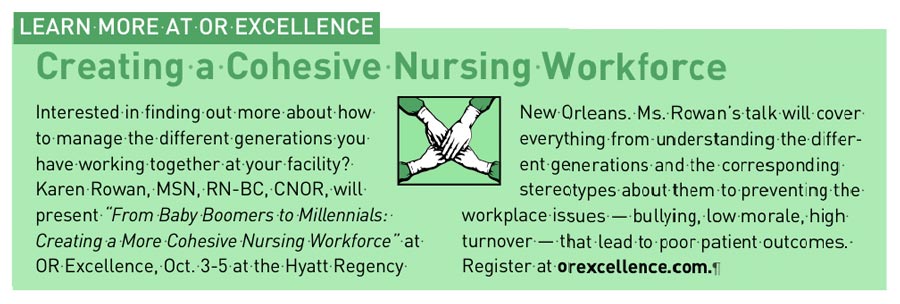Millennials are lazy, entitled narcissists. Baby Boomers are tech-illiterate dinosaurs too set in their ways to learn anything new. These tired stereotypes are not only patently false, they're also dangerous — especially in the stress-filled surgical arena where several generations of nurses and other skilled staff must work side by side. Here's how to ensure generational differences don't derail the productivity, morale and even retention rates at your facility.
1 Recognize the differences. As a surgical facility leader who oversees 2, 3 or sometimes even 4 (Baby Boomers, Generation X, Millennials and Generation Z) generations, it's up to you to understand what makes each group tick.
- Baby Boomers(born between 1946-1964). The largest economic group in the workforce, Baby Boomers are often seen as "workaholics." They tend to seek structure and believe rules must be followed (unless they disagree with said rules on principle). Boomers measure work ethic by hours worked, value teamwork and demand loyalty from their co-workers.
- Generation X (born between 1965-1976). Often referred to as "Latch Key Kids," this group experienced more divorces than any other generation, so they tend to place a premium on family time. From a work perspective, they expect immediate feedback (to give and receive), demand open communication and are all about "working smarter, not harder."
- Millennials (born between 1977-1995). Often referred to as the "Entitled Generation," Millennials are the most diverse generation in the workforce. Because they grew up with tech, they want instant gratification and tend to expect positive reinforcement from their managers. Work-life balance is crucial for this group, and they're twice as likely to become nurses than previous generations.
- Generation Z (born after 1995). This generation doesn't know a world without Internet. They're independent, self-directed and able to process information quickly, but they're often criticized for not being team players.
2Separate, then educate. When staff don't understand these generational differences, misunderstandings and resentments run rampant. Case in point: At my facility, some of the older, more experienced nurses couldn't understand why so many of the younger RNs refused overtime shifts. Until I reminded them, the older nurses didn't appreciate how important work-life balance is to Millennials. "Wow, I never thought of that," a Baby Boomer remarked. "I thought So-and-So was just lazy because she never wanted to work overtime." To prevent similar misunderstandings, we held workshops that broke our team into 2 groups: novice nurses and experienced nurses.
.svg?sfvrsn=be606e78_3)

.svg?sfvrsn=56b2f850_5)